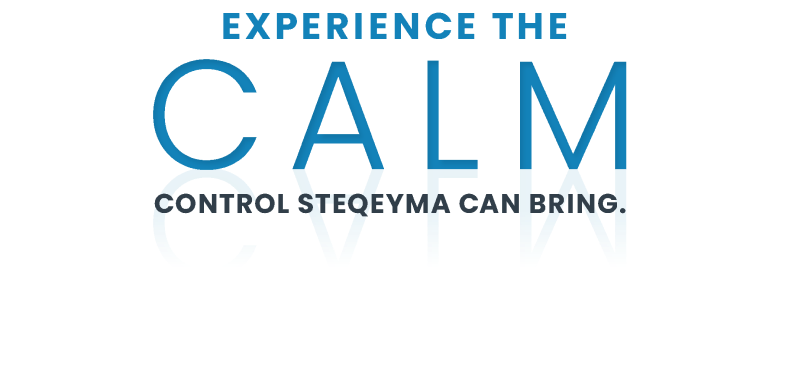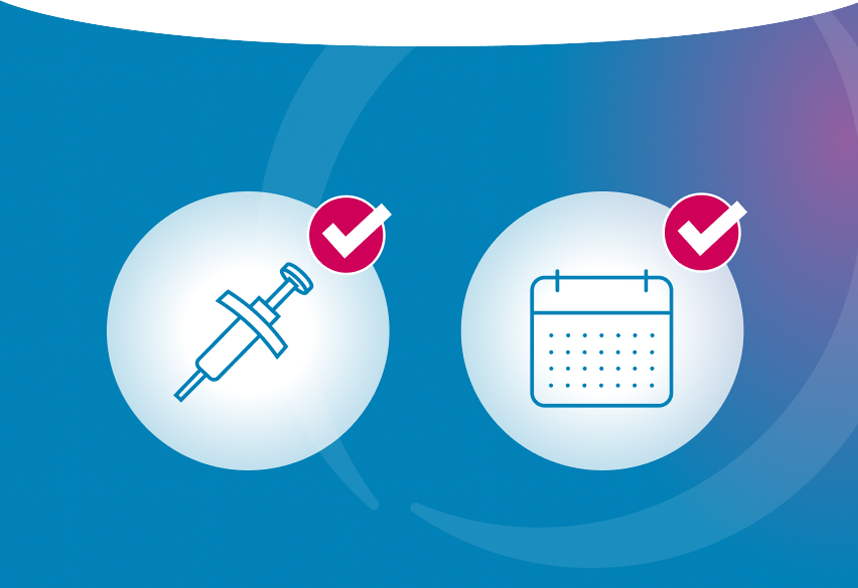IMPORTANT SAFETY INFORMATION
Contraindications. STEQEYMA is contraindicated in patients with clinically significant hypersensitivity to ustekinumab products or to any of the excipients in STEQEYMA.
Infections. Ustekinumab products, including STEQEYMA, may increase the risk of infections and reactivation of latent infections, including serious bacterial, mycobacterial, fungal, and viral infections requiring hospitalization. Reported infections include pneumonia, gastroenteritis, cellulitis, sepsis, cholecystitis, anal abscess, listeria meningitis, and ophthalmic herpes zoster. Avoid starting STEQEYMA in patients with active infections until resolved, and assess risks in those with chronic or recurrent infections. Advise patients to seek medical care for signs of infection. Discontinue STEQEYMA for serious infections until treated or resolved.
Theoretical Risk for Particular Infections. Genetic IL-12/IL-23 deficiencies are linked to disseminated infections (e.g., mycobacteria, salmonella, and BCG). It is unknown whether IL-12/IL-23 blockade from ustekinumab products may cause similar susceptibility. Consider diagnostic testing, such as tissue or stool cultures, based on clinical circumstances.
Pre-treatment Evaluation for Tuberculosis (TB). Evaluate patients for TB prior to starting STEQEYMA. Avoid using STEQEYMA in patients with active tuberculosis. Treat latent TB before starting STEQEYMA and consider TB therapy for patients with unclear treatment history. Monitor for signs of active TB during and after treatment.
Malignancies. Ustekinumab products are immunosuppressants that may increase the risk of malignancy. Malignancies occurred in clinical trials, and IL-12/IL-23 inhibition increased malignancy risk in rodent models. The safety in patients with a history of malignancy is unknown. Post-marketing reports include rapid onset of multiple cutaneous squamous cell carcinomas in patients with risk factors for non-melanoma skin cancer. Monitor all patients, especially those over 60, with prolonged immunosuppressant use, or a history of PUVA treatment.
Hypersensitivity Reactions. If an anaphylactic or other clinically significant hypersensitivity reaction occurs, institute appropriate therapy and discontinue STEQEYMA.
Posterior Reversible Encephalopathy Syndrome (PRES). Cases of PRES have been reported in clinical trials and postmarketing, with symptoms like headache, seizures, confusion, visual disturbances, and imaging changes. Onset ranged from days to over a year after starting ustekinumab. Patients recovered after discontinuation and supportive care. Monitor for PRES symptoms, and if suspected, treat promptly and discontinue STEQEYMA.
Immunizations. Ensure patients receive all age-appropriate immunizations before starting STEQEYMA. Avoid live vaccines during treatment and for one year before and after discontinuation. Do not administer BCG vaccines during this time. Use caution with live vaccines for household contacts due to the risk of shedding and transmission. Non-live vaccines may have a reduced immune response during STEQEYMA treatment.
Noninfectious Pneumonia. Noninfectious pneumonia, including interstitial, eosinophilic, and cryptogenic organizing pneumonia, has been reported with ustekinumab, presenting as cough, dyspnea, and interstitial infiltrates after 1–3 doses. Serious cases included respiratory failure and prolonged hospitalization. Patients improved with discontinuation and corticosteroids. Discontinue STEQEYMA and treat if confirmed.
Adverse Reactions
The most common adverse reactions (≥3%) reported in patients receiving ustekinumab were:
Psoriasis: nasopharyngitis, upper respiratory tract infection, headache, and fatigue.
CD induction: vomiting
CD maintenance: nasopharyngitis, injection site erythema, vulvovaginal candidiasis/mycotic infection, bronchitis, pruritus, urinary tract infection, and sinusitis.
UC induction: nasopharyngitis
UC maintenance: nasopharyngitis, headache, abdominal pain, influenza, fever, diarrhea, sinusitis, fatigue, and nausea.
Please see full Prescribing Information.


